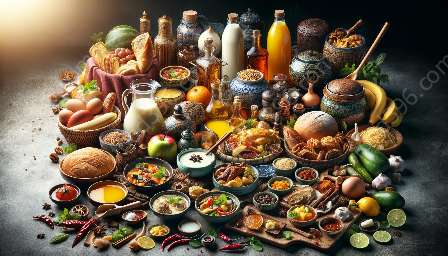African food culture is as diverse as the continent itself, and regional variations play a significant role in shaping unique culinary traditions. From North Africa's rich use of spices to the hearty stews of West Africa and the coastal flavors of East Africa, the continent's cuisine is a reflection of its history, geography, and varied cultural influences.
Exploring Regional Variations in Food Culture
When delving into African food culture, it becomes evident that regional variations are central to understanding the continent's culinary heritage. Each region boasts distinct ingredients, cooking methods, and flavor profiles that have been shaped by local agriculture, traditions, and external influences.
North African Cuisine
North African cuisine is characterized by its abundant use of spices such as cumin, coriander, and saffron. Prominent dishes like couscous, tagines, and hearty stews are staples of the region, reflecting its Berber, Arab, and Mediterranean influences. The use of couscous, a staple made from semolina, is a testament to the region's expertise in grain cultivation.
West African Cuisine
West African cuisine is known for its reliance on starchy tubers, such as yams and cassava, as well as the use of vibrant and spicy flavors. Dishes like jollof rice, fufu, and groundnut stew are popular throughout the region. The cuisine is also characterized by the use of palm oil and a variety of peppers, showcasing the diversity in flavor profiles across different West African countries.
East African Cuisine
East African cuisine showcases a fusion of indigenous ingredients with influences from Indian, Arab, and European trade routes. Coastal regions are known for their seafood dishes, while the interior areas rely heavily on grains and vegetables. Dishes like injera, a sourdough flatbread, and flavorful curries exhibit the diversity of flavors and ingredients in the region.
Southern African Cuisine
Southern African cuisine is influenced by both indigenous ingredients and European colonization. Staples like mieliepap, a maize porridge, and biltong, a form of dried, cured meat, are emblematic of the region's culinary heritage. The cuisine also features a wide variety of game meats such as ostrich, kudu, and springbok, reflecting the region's abundant wildlife.
Food Culture and History
Understanding African food culture without considering its historical context is incomplete. The continent's culinary traditions have been shaped by a complex tapestry of historical events, including trade routes, colonization, and migration. Indigenous ingredients and cooking techniques have interacted with foreign influences, resulting in a rich and diverse culinary landscape.
Historical Influences on African Cuisine
African cuisine has been influenced by a myriad of historical events, such as the transatlantic slave trade and the colonization of the continent. The introduction of new ingredients, cooking methods, and culinary traditions from Europe, the Middle East, and Asia has forever altered the continent's food culture. For example, the Portuguese brought chili peppers to Africa, which are now a fundamental component of many African dishes.
Traditional Cooking Techniques
Traditional African cooking techniques, such as slow simmering, pounding, and fermenting, have been passed down through generations, contributing to the depth of flavor in African cuisine. Across different regions, cooking methods have evolved to make the most of locally available resources, resulting in a wide variety of dishes that reflect the ingenuity of African cooks.
Modern Adaptations and Global Influence
Globalization and the interconnectedness of the modern world have resulted in the fusion of traditional African dishes with international culinary trends. African chefs and food enthusiasts are creatively blending traditional ingredients with modern techniques, leading to innovative and contemporary interpretations of classic dishes. This evolution highlights the dynamic nature of African food culture and its ability to adapt to a changing world.
Conclusion
African food culture is a tapestry of diverse regional variations and a reflection of the continent's rich history and cultural heritage. Exploring the unique culinary traditions of North, West, East, and Southern Africa offers a glimpse into the continent's vast and vibrant food landscape. The fusion of history, geography, and cultural influences has produced a culinary heritage that continues to captivate and inspire food enthusiasts around the world.

